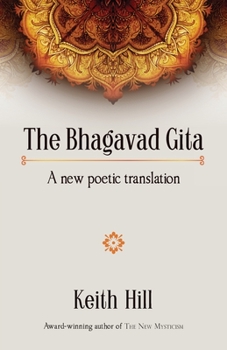The Bhagavad Gita: A new poetic translation
Select Format
Select Condition 
Book Overview
On the battlefield of life, desiring to do our best, how should we act? Which values should we live by? What metaphysical outlook best explains what happens to us? How do we express our spiritual nature? And how can we stay spiritually focused in the whirl of daily activity?
Arjuna s searching questions, asked on the brink of a war he is loathe to fight, and Krishna s profound answers, spoken in his chariot as they survey the battlefield on which thousands will soon die, offer timeless insights into the difficulties and wonders of human existence, making the Bhagavad Gita one of the great works of world spirituality.
Originally written in poetry, but usually presented in English in prose, this version balances the need to present the Bhagavad Gita s profound concepts precisely while reproducing the original s dramatic and poetic power. This translation is especially successful in capturing the Bhagavad Gita s shifts of tone, moving from vivid descriptions of the battlefield, to the precise reasoning of Krishna s advice to Arjuna, to the sublime visionary intensity of Krishna as cosmic being. Endnotes and a glossary help readers unfamiliar with Indian culture understand the poem s mythological and philosophic references.
Excerpt from Discourse Two:
The Lord said:
You grieve for those who require no grief,
confusing yourself with words of false wisdom;
wise men mourn neither living nor dead.
For there was never a time when I was not,
nor when you and these kings did not exist,
nor, hereafter, when we will cease to be.
The embodied passes from infancy to death,
just so it enters another body;
the wise are not deceived over this.
Heat and cold, pleasure and pain, each arise
when the senses and their objects meet.
But they are transitory. Transcend them, therefore.
That man to whom pain and pleasure are the same,
who, Arjuna, by these remains undisturbed,
becomes a candidate for immortality.
Nothing can come to be from non-being,
nor can what has existence cease to be;
this reality is perceived by those who know.
Understand, that which extends throughout
the entire cosmos is imperishable;
indestructible, none can destroy it.
The embodied is immeasurable,
eternal, imperishable; its bodies
finite only. Therefore, Arjuna, fight





